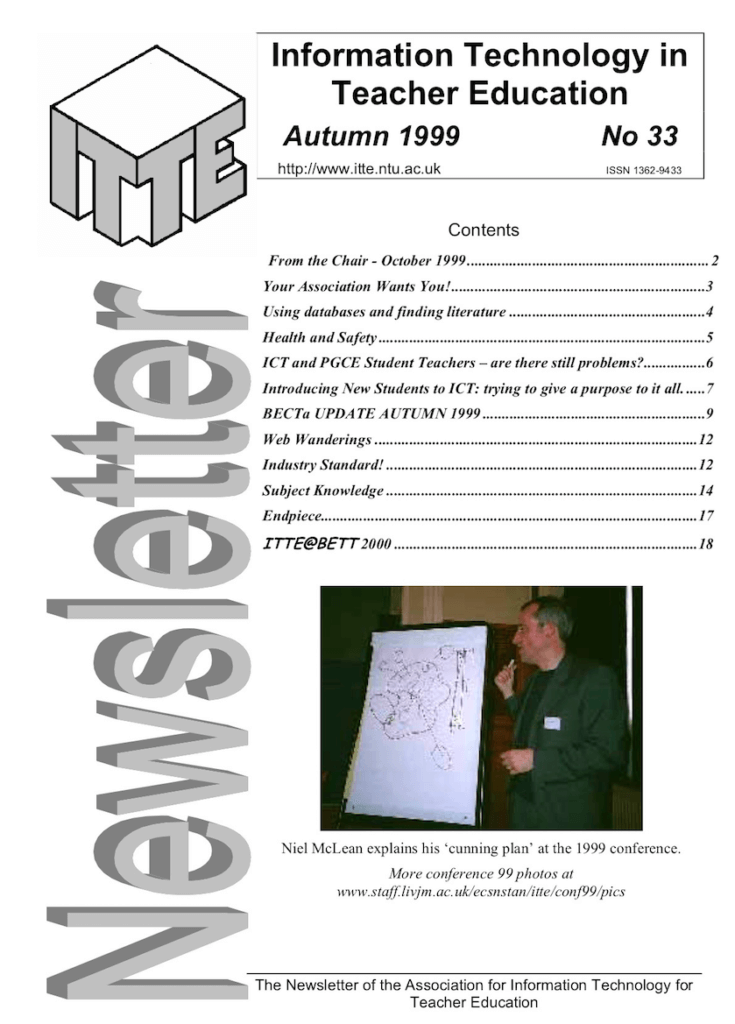20 years of ‘progress’ in education technology?
Author: Chris Shelton
Amongst the many treasures on the ITTE website is an archive of the association’s newsletters starting with Number 31 from 1999. You can read them here:
The three newsletters in the archive from 1999 still make for an interesting read and might prompt some thoughts on what has changed and what has stayed the same over the last 20 years.
Clearly, technology has moved on in the last two decades. My phone and laptop are far more powerful than those I used in 1999 and some of the software I used with my pupils then has long since been superseded. This is reflected in some of the articles in the newsletters: we no longer have any need for reports from the government’s ‘Electronic Mail in Schools Taskforce’ and debates about the pros and cons of some particular technologies or internet services now feel redundant.
However, technology may not have moved on as much as we might have expected. For example, parts of Andy Cooper’s article about a new Soft Electronics microcontroller could have been written today about Microbits or Arduino:
“The latest developments in micro-controller chips and programming software open new windows of opportunity for D&T by allowing students to program and install miniature computers, in products they design and make.”
However, the main focus of ITTE and its newsletters has never been on the particular technologies of the time but on the more important issues of pedagogy, knowledge and research. And it’s probably fair to say that progress in these areas over the last 20 years has been mixed. The concerns expressed by technology researchers in 1999 about finding decent quality research; selecting effective and appropriate research methods; or the need to submit papers to our journal very soon if they are to count towards the 2000 Research Assessment Exercise all sound a little too familiar.
Debates and ideas about what new teachers should know and be able to do raise issues that are still very relevant now even though the discussions in the newsletters reflect a very different school context (and remind us of how much this context has changed). For example, some contributions to a discussion about what subject knowledge a Secondary IT teacher needed suggested programming skills were nothing more than a marginal advantage given the syllabus in place at the time.
Sometimes the discussions seem prescient. The change of name of the subject IT to ICT in the 2000 National Curriculum provoked much debate and there are obvious parallels to the 2014 name change to Computing:
“Changing the name now gives the impression that something fundamental has changed since the current government came to power, which is only to the advantage of the politicians.” (Steve Kennewell)
In fact, with hindsight, some comments seem to foresee the external influences that led to the later change of name away from ICT:
“Industry and commerce do not use ICT and have never heard of it – if the government is going to make education more relevant to the world of work, lifelong learning, the university of industry etc. then education must be up to date with the much greater and more influential world outside.” (Margaret Cox)
The newsletters also include some interesting ideas for our association, for example, the tradition in 1999 that the last person to register for the annual conference had to write up a conference summary for the newsletter. Maybe we should bring this back for our conference in Winchester this July?
But there are also some areas where progress may have been lost in the last 20 years. The newsletters report the huge amount of work that was being done by ITTE members and by organisations such as Becta on finding effective ways of using technology in all subjects. Reports of new resources or reports for particular curriculum subjects, e.g. maths, or projects to improve the inclusion of pupils with Special Educational Needs are needed just as much now as they were then. But such concerns are not as high profile now as they were in 1999. For example, one newsletter reports on a meeting with the then Minister for Learning and Technology (Michael Wills MP) – there’s no equivalent of this role today (though we can debate whether we would want one)! Other articles discuss the recently released ICT standards for QTS and how they would be implemented – it would be interesting to compare the expectations for student teachers use of ICT in 1999 with the reality today.
Why not take a few minutes to look at an old newsletter from the archive and think about what has changed and if there’s anything we might want to rediscover!


Comments
20 years of ‘progress’ in education technology? — No Comments
HTML tags allowed in your comment: <a href="" title=""> <abbr title=""> <acronym title=""> <b> <blockquote cite=""> <cite> <code> <del datetime=""> <em> <i> <q cite=""> <s> <strike> <strong>